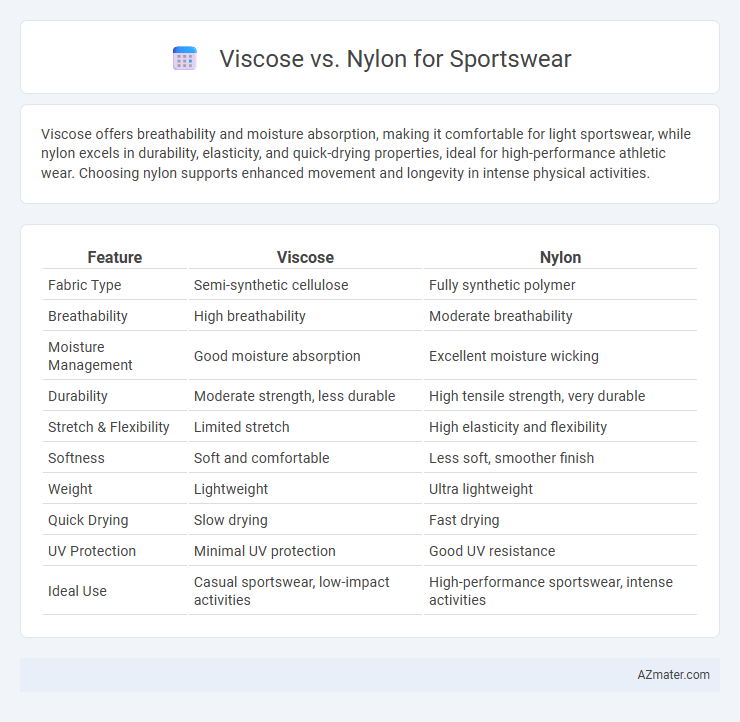Viscose offers breathability and moisture absorption, making it comfortable for light sportswear, while nylon excels in durability, elasticity, and quick-drying properties, ideal for high-performance athletic wear. Choosing nylon supports enhanced movement and longevity in intense physical activities.
Table of Comparison
| Feature | Viscose | Nylon |
|---|---|---|
| Fabric Type | Semi-synthetic cellulose | Fully synthetic polymer |
| Breathability | High breathability | Moderate breathability |
| Moisture Management | Good moisture absorption | Excellent moisture wicking |
| Durability | Moderate strength, less durable | High tensile strength, very durable |
| Stretch & Flexibility | Limited stretch | High elasticity and flexibility |
| Softness | Soft and comfortable | Less soft, smoother finish |
| Weight | Lightweight | Ultra lightweight |
| Quick Drying | Slow drying | Fast drying |
| UV Protection | Minimal UV protection | Good UV resistance |
| Ideal Use | Casual sportswear, low-impact activities | High-performance sportswear, intense activities |
Introduction to Viscose and Nylon in Sportswear
Viscose and nylon are prominent fibers in sportswear, each offering distinct benefits tailored to athletic performance. Viscose, a semi-synthetic fiber derived from cellulose, excels in moisture absorption and breathability, making it comfortable for moderate-intensity sports. Nylon, a synthetic polymer, stands out for its exceptional durability, elasticity, and quick-drying properties, ideal for high-impact and endurance activities.
Key Differences Between Viscose and Nylon
Viscose and nylon differ significantly in fiber origin and performance characteristics, with viscose being a semi-synthetic cellulose fiber derived from wood pulp, offering breathability and softness ideal for comfort-focused sportswear. Nylon, a fully synthetic polyamide, excels in durability, elasticity, and moisture-wicking properties, making it suitable for high-intensity athletic activities requiring stretch and resilience. The key differences lie in moisture management--nylon dries faster and resists water absorption, whereas viscose absorbs moisture but provides better temperature regulation during moderate workouts.
Moisture-Wicking Properties: Viscose vs Nylon
Nylon outperforms viscose in moisture-wicking properties, making it a preferred choice for sportswear designed to keep athletes dry during intense workouts. Viscose tends to absorb moisture but lacks efficient evaporation, leading to dampness and discomfort. Nylon fibers promote rapid moisture transfer away from the skin, enhancing breathability and quick-drying, which are critical for optimal athletic performance.
Comfort and Breathability Compared
Viscose offers natural breathability and moisture-wicking properties, making it highly comfortable for sportswear by keeping the skin dry and cool during intense activity. Nylon provides excellent durability and stretch but tends to trap heat and moisture, which can reduce overall comfort in high-sweat conditions. Choosing viscose enhances ventilation and softness, while nylon excels in elasticity and resilience for dynamic movements.
Durability and Longevity
Nylon outperforms viscose in durability and longevity, making it ideal for sportswear subjected to frequent wear and intense physical activity. Its high tensile strength and resistance to abrasion ensure prolonged fabric integrity, while viscose, derived from natural cellulose fibers, tends to weaken when wet and degrades faster over time. For athletes seeking reliable, long-lasting performance fabrics, nylon-based sportswear offers superior resilience and sustained quality.
Sustainability and Environmental Impact
Viscose, derived from renewable natural cellulose, offers better biodegradability compared to synthetic nylon, which relies on non-renewable petrochemicals and contributes to microplastic pollution. The production of viscose often involves intensive water and chemical use, raising concerns about deforestation and pollution unless sourced from certified sustainable forestry. Nylon's energy-intensive manufacturing process results in higher carbon emissions, but advancements in recycling technologies are improving its environmental footprint for sportswear applications.
Stretch and Flexibility in Athletic Use
Viscose offers moderate stretch and breathability but lacks the robust elasticity required for dynamic athletic movements, making it less ideal for high-performance sportswear. Nylon, known for its exceptional stretch and recovery properties, provides superior flexibility and durability, essential for intense physical activities and prolonged wear. The inherent elasticity of nylon supports muscle movement and enhances comfort, outperforming viscose in sportswear applications where strength and flexibility are critical.
Care and Maintenance Requirements
Viscose sportswear requires gentle hand washing or delicate machine cycles with mild detergent, avoiding high heat drying to prevent fiber damage and shrinkage. Nylon sportswear offers superior durability and easy care, as it can be machine washed and dried on low settings, resisting wrinkles and retaining shape longer. Proper care of viscose extends garment lifespan, while nylon's quick-drying and abrasion-resistant properties make it ideal for frequent athletic use.
Cost Comparison: Viscose vs Nylon Sportswear
Viscose sportswear typically costs less than nylon due to its natural cellulose base and simpler manufacturing process. Nylon, a synthetic polymer known for durability and moisture-wicking properties, commands higher prices reflecting advanced production techniques and performance benefits. Budget-conscious consumers often prefer viscose for affordability, while athletes and activewear brands invest in nylon for its superior strength and longevity despite the higher cost.
Best Sportswear Applications for Each Fabric
Viscose excels in sportswear applications requiring breathability and moisture absorption, making it ideal for light activities and casual wear where comfort and softness are prioritized. Nylon offers superior durability, elasticity, and quick-drying properties, making it the preferred choice for high-performance sportswear, including running gear, swimwear, and compression garments. Each fabric serves distinct roles: viscose enhances comfort in low-impact sports, while nylon supports intense physical activity with its strength and resilience.

Infographic: Viscose vs Nylon for Sportswear
 azmater.com
azmater.com